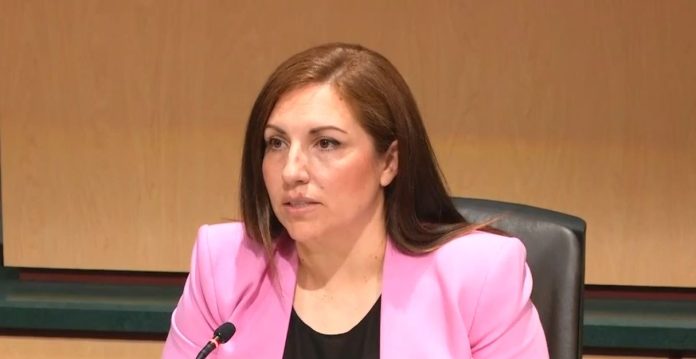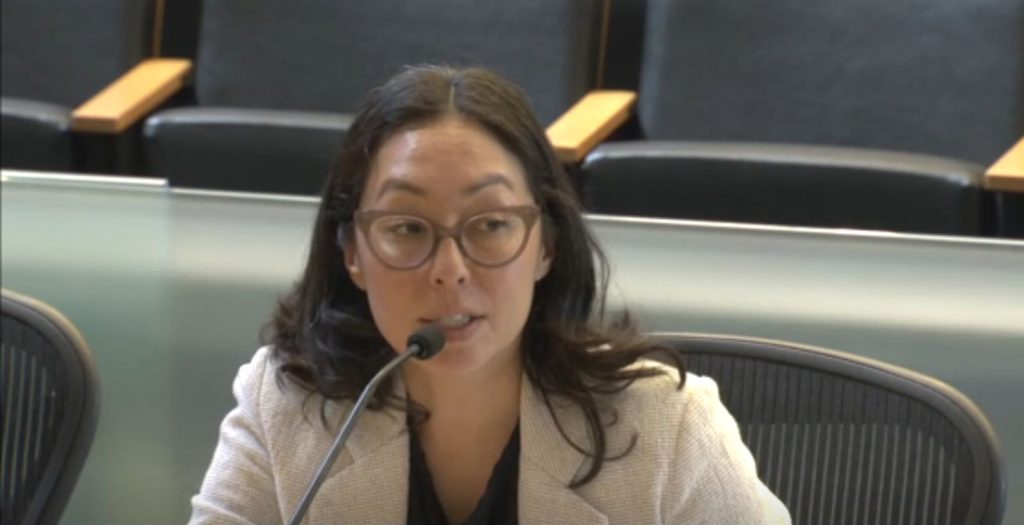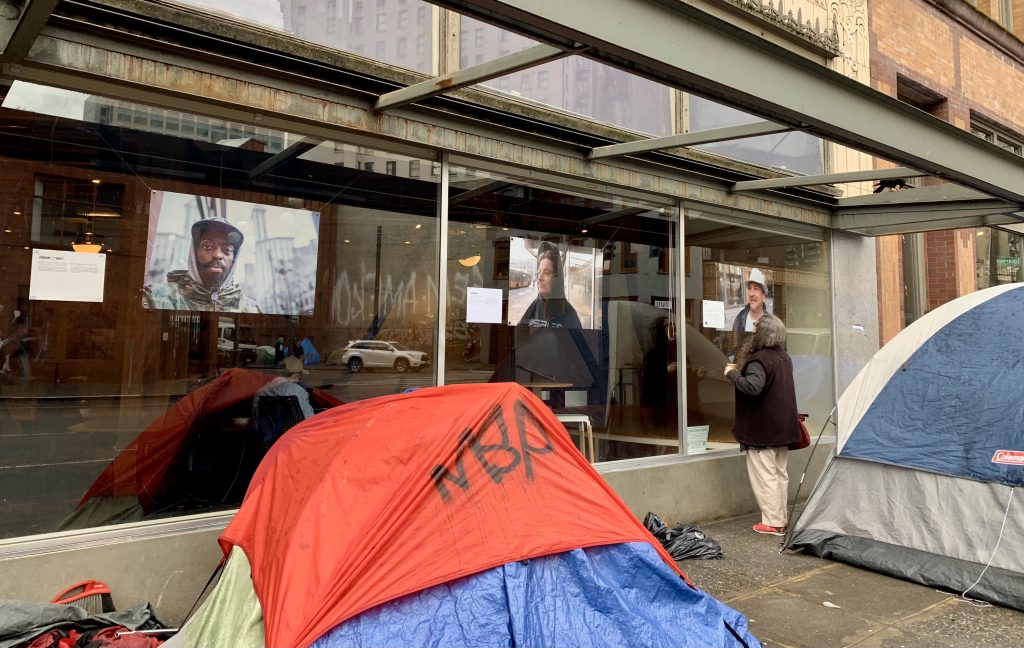
Trump is set to deepen the homelessness crisis, while kids face ICE deportation without any legal defense.
Local governments are continuing to struggle to respond to the continuous chaos that seems to characterize the current presidential administration.
President Donald Trump’s tariffs have caused the stock market to tumble, the risks of recession to grow, and Washington State’s trade-dependent economy to brace for hardship to come. At the same time, sweeping cuts enacted by billionaire Elon Musk’s Department of Governmental Efficiency (DOGE) are gutting the country’s public health, human services, housing, and emergency management programs, among many others, while universities are having their research funding frozen or cut and immigration enforcement activities are ramping up.
Washington State Attorney General Nick Brown has now filed or joined 11 lawsuits against the new Trump administration, including most recently for delaying and cancelling medical and public health research, to protect election integrity, and to protect libraries and museums.
While waiting for these lawsuits to wend their way through the courts, a process that can easily take months, city and county governments have to grapple with current realities while also trying to plan for the future against a landscape of deep uncertainty.
King County resolves not to comply
King County receives $200 million in revenue every year from the federal government, in addition to many federal dollars passed through the state government, much of which is through the Medicaid program, which is called Apple Health in Washington State.
Last week at the King County Council’s Health, Housing, and Human Services committee meeting, King County’s Director of the Office of Performance, Strategy, and Budget Dwight Dively explained that there are three kinds of risk the county is currently facing with regards to the federal government.
The first risk is the county not receiving money that’s already been allocated through grants and contracts. Many lawsuits have been filed to try to prevent promised money from being frozen, withheld, or otherwise stopped, but not all agencies have complied with federal court orders to continue to dispense promised funds.
“These cases are inevitably headed for the U.S. Supreme Court, and the Supreme Court is going to have to decide whether the Constitution and the impoundment Act apply to this president or not,” Dively said.
The second risk, which is just starting to appear, is county grants that are routinely renewed every year now having conditions applied to them that violate county ordinance and/or state law, for example, by requiring the grant-receiving agency to comply with all executive orders. The county is not planning to accept funding for grants with stipulations like these, meaning the money will be lost until the matter can be litigated. Dively referenced the fact that many recent executive orders are “probably illegal.”
This second risk will likely lead to critical services being either reduced or eliminated and county jobs being lost. “I share the view that we have to stand on principle. Somebody has to,” Dively said. “But there are very dire real world consequences, at least in the short run, from taking that position.”
While King County Metro and the climate office have been able to access funds for current grants and certain grants have been renewed without new conditions, $4.4 million in grants to Public Health – Seattle & King County and the Department of Community and Human Services (DCHS) have been canceled in the last few weeks. The county will have to decide whether to enter into litigation for this money, and whether to backfill the amounts missing in the meantime while not knowing if their legal actions will be successful.
The third risk centers around future federal dollars for domestic discretionary programs, especially Medicaid. The U.S. House passed a budget resolution in February that only seems achievable through substantial cuts to Medicaid. Dwight said that much of those funds go to fund programs at Public Health and DCHS.
“That’s not a sure thing yet, but that’s a very risky sign about what might happen in the future,” Dively said.
Congress would need to pass 12 appropriations bills by September 30 in order to make these cuts to Medicaid and other discretionary programs. If they do, cuts could go into effect as soon as October 1. However, Congress has only managed to pass all its appropriations bills on time four times in the last 50 years, the last time being 1996. Any cuts that occur due to congressional budgetary action would not be eligible for litigation.
In addition, several federal agencies are looking at either having their workforces deeply reduced or being completely eliminated, which would also have large impacts on local municipalities. Agencies that could be on the chopping block include the Substance Abuse and Mental Health Services Administration (SAMHSA), the Institute of Museum and Library Services, the Internal Revenue Service (IRS), the Center for Disease Control (CDC), the National Weather Service, the Department of Education, and the Federal Emergency Management Agency (FEMA).
Between cuts to essential services like Medicaid and the potential loss of entire federal agencies, local governments would be on the hook for a huge amount of money if they wanted to continue to provide public services at a similar level. Federal cuts could lead to less money to help people recover from natural disasters, an increase in homelessness, an increase in health issues, fewer people able to get substance use disorder treatment and behavioral health treatment, and more.
Medicaid expansion in the past has been shown to be correlated with a reduction of violence.
“The pressure on state governments, local governments and nonprofits will be intense, and unfortunately, none of us have the federal government’s ability to tax and to borrow, and so we will be in a situation where we probably can’t replace all of those cuts,” Dively said.
Cuts to or disappearance of these agencies would not only threaten local governments’ budgets but would leave large amounts of valuable and sometimes essential work undone, much of which Americans have grown accustomed to.
“Even though we have one of the best local public health departments in the country, we don’t have thousands of researchers. We don’t have people who are trying to figure out what the next best vaccine we need to provide is. We don’t have people who can track worldwide epidemics and figure out when they’re going to show up here so we can be ready,” Dively said. “That’s the kind of information that we’re going to lose if the federal government continues down this path.”
King County Councilmember Teresa Mosqueda asked Dively to return to her committee to give updates every month and expressed her support for taking a principled stance when responding to the federal government.
“I think one thread that we’re hearing is not complying with executive orders immediately, not being complicit in these actions, because many of them will either be rolled back on their own accord because they’re too confusing and nonsensical, or they will be found illegal, as we are seeing many of the executive orders that are currently being challenged,” Mosqueda said.
Funding cuts mean more unaccompanied children face ICE without attorneys
Last week at the Seattle City Council’s monthly Select Committee on Federal Administration and Policy Changes meeting, councilmembers began discussing a draft resolution declaring Seattle to be a welcoming city. In addition to stating specific intentions around being a welcoming city, the resolution expresses a commitment to add $300,000 to Seattle’s Office of Immigrant and Refugee Affairs to meet emerging needs of those running afoul of the Trump administration’s new aggressive anti-immigrant policies.
That money might be best used to try to fill some of the gap caused by federal funding cuts to the Unaccompanied Children Program and the U.S. Citizen and Immigration Services (CIS) citizenship grant program, both of which supported legal assistance for unaccompanied immigrant and refugee children.
Tim Warden-Hertz with the Northwest Immigrant Rights Project said that the number of detainees at the immigration detention center in Tacoma has grown from 800 to 1,400 people since Inauguration Day. He said other federal funding for legal defense work is also at risk.
Meanwhile, due to federal funding cuts, the Seattle Office of Kids in Need of Defense (KIND) is closing in May. As a result, they are having to withdraw from almost 250 cases of unaccompanied children.
“Data shows that immigration judges are almost 100 times more likely to grant relief for unaccompanied children with legal counsel than with those without,” said Jessica Castellanos, KIND’s managing director.

KIND is able to continue representing 55 children’s cases due to funding from the City of Seattle. With the $300,000 in the council’s proposed resolution, they could represent an additional 60 children or more.
“Now more than ever, we really need local funding to continue to support the children and youth in our communities,” Castellanos continued. “These are children and youth who have been abandoned, abused, and neglected, who are fleeing terrible things in their home countries, and have gone through so much to be here and to stay here, and this is not the time for our community to abandon them.”
Councilmember Alexis Mercedes Rinck, who chairs the select committee after lobbying for its creation, appeared swayed by that line of argument.
“These are Seattle kids, and I know I’m not the only one whose heart breaks at the thought of a six-year-old needing to appear before a judge to defend themselves in immigration proceedings by themselves,” Rinck said. “We know that we will not be able to make up every financial gap, but we must do our best to do right by them.”
Councilmember Martiza Rivera, however, cautioned that the council is not able to do anything immediately. While the mid-year supplemental budget could be the most likely opportunity for the council to take concrete action, Rivera emphasized the council would need to find somewhere in the budget from which to redirect the funding.
The resolution will not receive a committee vote until May 16 at the earliest.
Attacks on HUD likely to deepen homelessness crisis
Leaders in Seattle and King County have long battled with homelessness, with no clear end in sight. Seattle Mayor Greg Nickels and King County Executive Ron Sims launched a 10-year campaign to end homelessness in 2005, which failed to deliver. Mayor Ed Murray declared a homelessness emergency in 2015, but he and his successors faced similar hurdles. Uncertainty, cuts, new restrictions to receive federal funding, and tariffs could all greatly exacerbate the crisis, both through decreasing the housing supply and available services and leading to more people becoming unhoused.

The Trump administration recently ramped up duties on Canadian lumber imports, which account for about a quarter of supply in the U.S., and has additional tariffs planned for lumber and steel. The moves have already spooked investors and led to a selloff of stock in homebuilders. A trade war on lumber, steel and other building materials appears poised to spike costs for homebuilders — which would soon raise housing costs as supply constricts.
Reduced capital and spending power among private-sector builders will not be offset by public sector investment, which Trump is also slashing.
In February, the US Department of Housing and Urban Development announced they would be reducing their staffing by 50%, which will create difficulty in awarding and administering their funding programs. The Trump administration has withdrawn grants from organizations that enforce the Fair Housing Act, stalled funding for affordable housing, and halted its $1 billion Green & Resilient Retrofit Program.
Also recently dismantled is the federal Low-Income Home Energy Assistance Program (LIHEAP) program, which helped low-income people pay their utility bills and access energy efficiency upgrades. Jess Blanch of Enterprise Community Partners said it is too soon to say what will be happening to the funding attached to the program, of which Washington State had been receiving $66.5 million per year.
Uncertainty is causing difficulty around the financing of local affordable housing projects. The pricing for federal tax credits that is used to finance affordable housing is dropping dramatically due to federal policies, while the upfront cost of building projects is going up. The uncertainty around Trump’s tariffs leads to fluctuation in financing because of the possible increased price of key building materials. The tariffs could also lead to increased inflation, which would in turn lead to higher interest rates, making financing more expensive.
Federal policy around homelessness is also changing.
The King County Regional Homelessness Authority (KCRHA) receives $66 million annually from the federal government, both directly and indirectly through King County. The agency now faces a choice as to whether to accept their next batch of funds that come with the requirement of verification of immigration status for the population it serves.
“These funding delays or reductions could prevent states and communities, nonprofit organizations and homeless individuals and families from receiving the critical resources needed to address the crisis on sheltered and unsheltered homelessness,” said KCRHA Deputy CEO Simon Foster.
“We expect continued shifts by the administration to federal homelessness policy, including movement toward treatment first approaches that require services and treatment as a precondition to housing,” said Jess Blanch of Enterprise Community Partners.
Hampered by federal pullback, governments are providing insufficient money across the country to maintain current levels of homeless services because of fair-market rent adjustments, Blanch said. She added that the amount provided for Section 8 rental assistance is also far short of what is required, leaving 32,000 additional families at risk of homelessness nationwide.
The U.S. Department of Housing and Urban Development (HUD) has said it will release all remaining emergency housing voucher funding in late April. While this funding might be enough to last into 2026, it was originally intended to be provided through 2030. This puts an additional 60,000 people at risk of homelessness.

Enterprise has recently had Section 4 HUD funding canceled due to what Blanch referred to as their “supposed noncompliance with the DEI executive order.” This prevented them from releasing their most recent planned round of grants that were slated to go to many local organizations such as Chief Seattle Club and the Downtown Emergency Service Center (DESC).
DESC executive director Daniel Malone said his organization has recently lost some health and human services funding they had been receiving to support outreach and engagement services for people with opioid use disorder. Much of DESC’s funding goes to support social worker staff, so a loss of funding will directly lead to fewer people available to offer services.
And if Medicaid should be significantly cut, that would impact the services DESC is able to offer, including outpatient behavioral health services, substance use disorder treatment, case management services, mobile and facility-based crisis response services, opioid treatment work, and housing services in permanent supportive housing.
“Simply put, the solutions to our challenges have never been simple, and they grow more complex with every passing day,” Rinck said. “It will take all of us, every member of this body, every community leader, every resident of our neighborhoods, to work together to carve a path forward, to protect residents and create the future we all want to live in.”
While Rinck has been determined to daylight the increasingly grave problems facing our local region, it remains to be seen whether the rest of the council will be willing to do more than pay lip service to the destruction being wrecked by the Trump administration. Reportedly, Council President Sara Nelson has been reluctant to even schedule committee meetings to discuss it.
Ratifying the Welcoming City resolution would be the first step of many necessary to make a substantive difference in the lives of those who are being most impacted by Trump and Musk’s rampage through the federal government.
Amy Sundberg is the publisher of Notes from the Emerald City, a weekly newsletter on Seattle politics and policy with a particular focus on public safety, police accountability, and the criminal legal system. She also writes science fiction, fantasy, and horror novels. She is particularly fond of Seattle’s parks, where she can often be found walking her little dog.


